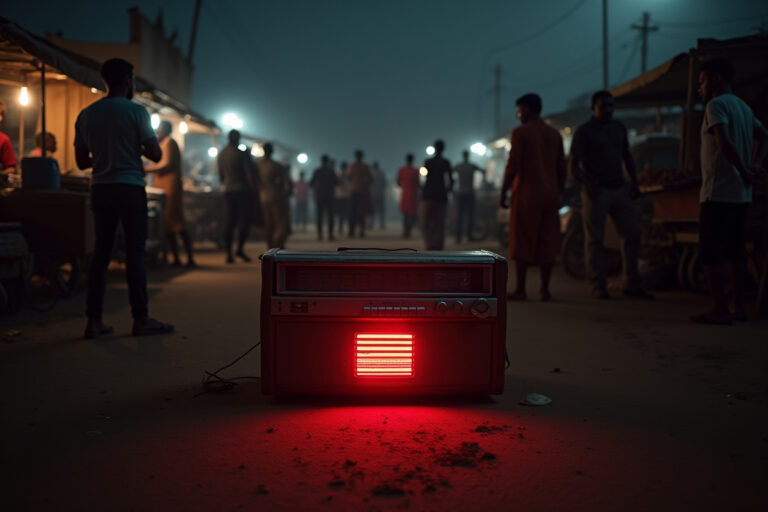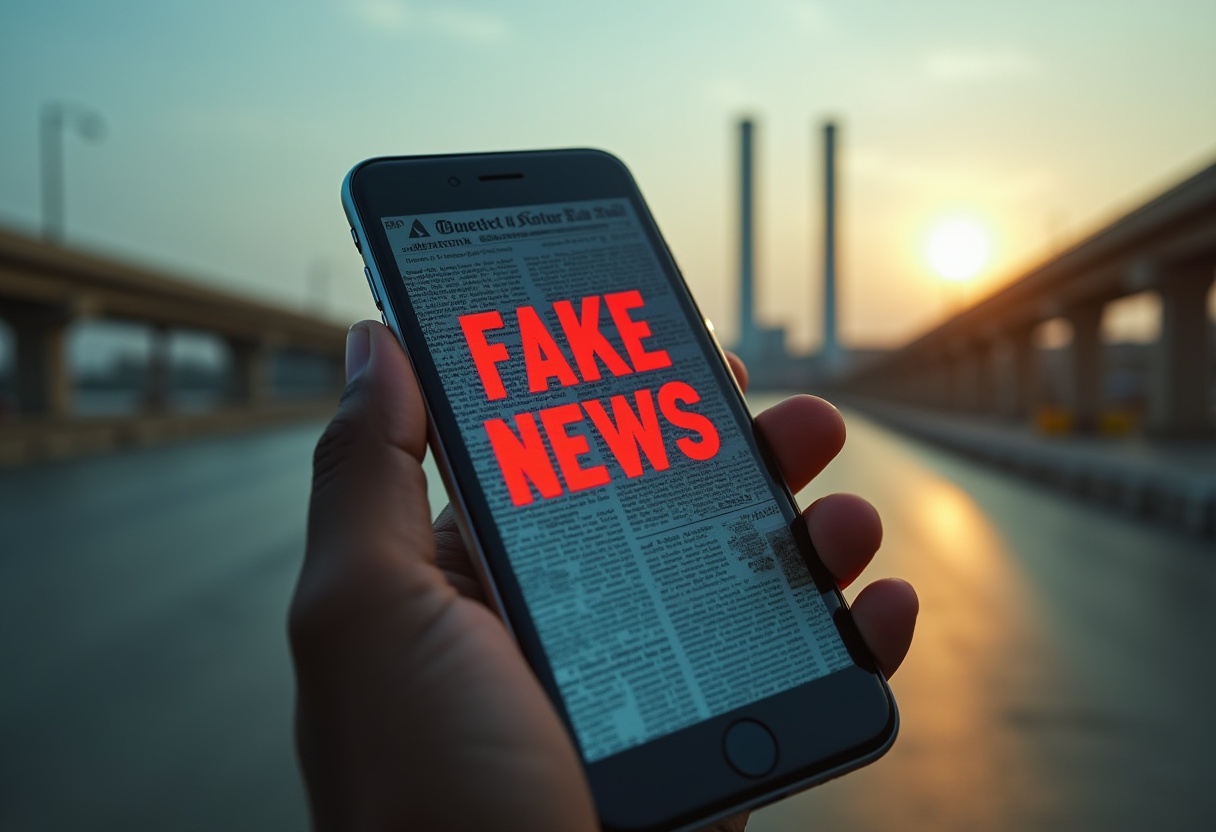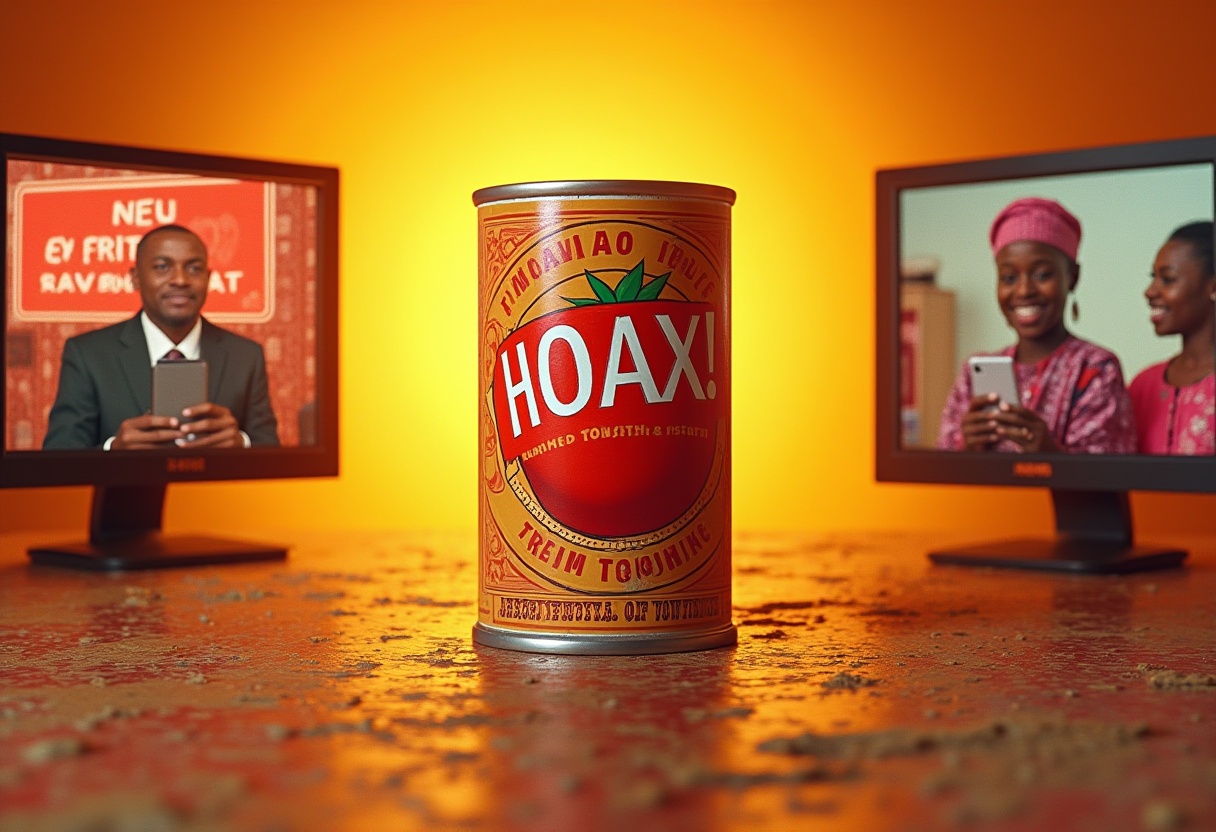How false information spreads through platforms
It started on a Tuesday. The kind of morning that carried small wahala in its breeze. The air was thick, not just with humidity, but with that familiar tension northerners knew too well. The kind that said, today will show us pepper.
In the heart of Kauran Bello town, the square was already waking. Women balanced coolers of kunu on their heads, shouting prices. Okada riders zigzagged past traders arranging vegetables. A boy beat a makeshift drum using his mother’s aluminium pot. Somewhere in the background, someone played Labarina theme song from a dusty speaker, the sound crackling like dry firewood.
But the real gist was not in the noise. It sat quietly in the centre of the square. An old, strange radio. Black. Boxy. No logo. No wires. No power source. Yet somehow, it worked. People called it The Radio Box.
It looked harmless. Like something your grandfather would keep under his bed. But when you spoke to it, it answered. Not with music. With information. Or what sounded like information.
People no longer walked past it. They gathered around it. Like flies to kilishi. Curious. Addicted.
Nobody knew who placed it there. Some said it came from a political rally. Others said a man in white dropped it one night and vanished before the call to prayer.
What they did know was this: the Radio Box talked. Not like BBC Hausa or Freedom Radio. It whispered. It revealed secrets. Or what felt like secrets. The kind that made people’s mouths hang open and friendships scatter like beans on the floor.
Today, standing in front of the box was Hauwa, the owner of Hauwa’s Kitchen. Famous for her tuwo and spicy miyan kuka.
She stared at it, wrapper tied tightly around her waist, lips pressed in suspicion.
“Oya. Tell me. What is happening behind my back?”
The box remained still for a moment.
Then, it lit up. A soft red glow. A voice came out. Slow. Calculated. Confident.
“Your neighbour Zainab has copied your recipe. She plans to open her own kitchen across the street. Watch how she watches you every morning.”
Hauwa gasped.
“I knew it. I saw her buying the same dry fish I use. She even asked, ‘Aunty Hauwa, is that maggi or secret leaf?’ Ha. Allah ya isa.”
Just then, Bello strolled in. Tall and restless, one of those boys always holding two phones and chewing suya stick like toothpick. His glasses were foggy from the heat.
“Una still dey here? This box na gossip station abi?”
Hauwa hissed. “Bello, be serious. Ask it something. Let it expose your enemies too.”
Bello laughed. “Last week it said my lecturer was collecting bribes. I asked him. The man said, ‘Bello, go and study before you blame technology.'”
Another boy stepped forward. His name was Sani, but everyone called him Cy. He wore fake Yeezys and always had stories. He tapped the radio box once, like greeting it.
“I believe this thing. Last time, it said NEPA people dey use our transformer money to buy cow for wedding. I even saw video on Facebook. Pure proof.”
Bello raised a brow. “That video was from Ghana. And it was not even transformer. It was a cooking gas delivery.”
Cy shrugged. “Still sounds like Nigeria.”
The crowd laughed a little.
Then a girl stepped into view. Quiet. Sharp-eyed. Dressed in jeans and hijab. Her name was Maimuna, fresh from Abuja. People said she worked with one NGO before. The kind that organised media training without lunch.
She crossed her arms, looked at the box and spoke clearly.
“You people do realise this box only tells you what you already suspect?”
The square went still.
“It does not give you truth. It gives you theatre.”
Hauwa narrowed her eyes. “Theatre ke? You think I am acting? This box said Zainab is sabotaging my food. And she wore green today. That is the colour of envy.”
Maimuna stepped closer.
“Did the box show you evidence? Screenshot? Receipt? Or just gist?”
“It does not need to. I feel it.”
Maimuna smiled, small and sharp. “Exactly. That is how it works. It says just enough. You fill in the blanks. It turns your suspicions into headlines in your head.”
The box glowed again.
“She is trying to deceive you. Do not let her confuse you.”
Everyone turned to Maimuna.
Hauwa folded her arms. “Even the radio knows.”
Maimuna chuckled. “This box is just like that aunty in your family WhatsApp group. She forwards voice notes that start with ‘Very urgent, just heard now’ and ends with ‘Share to ten people if you love your destiny.’”
The crowd chuckled nervously.
Bello tilted his head. “So you dey say this thing na scam?”
“I am saying it reflects your fears. Not the truth. That is why fake news feels so real. It speaks like your thoughts, not your facts.”
Just then, the box glitched. Its red glow flashed blue. Then, for one strange second, the screen on its side flickered.
No one saw their reflection.
They saw puppets. Strings tied to their heads. Moving like marionettes, controlled by invisible hands.
Then it disappeared.
Hauwa blinked. “Did you see?”
“I saw,” Bello replied quietly.
No one said a word.
Then, slowly, a little girl stepped forward. She looked no older than eight. Braids full of coloured beads. She pointed at the box.
“Radio, is it true that my uncle is the one hiding my mummy’s phone?”
The box paused.
Everyone leaned in.
Then it said, “Yes.”
From the back of the crowd, a man shouted. “Kai! I told you. That uncle has been suspect since 2015.”
The square erupted.
People turned on each other. Shouting. Pointing fingers. One man accused his neighbour of poisoning his goat. A woman called her cousin an informant for the village chief. Old fights came back. New ones began. Phones rang. Messages flew. Group chats exploded.
And Maimuna?
She turned away slowly, eyes dark.
“This is how it starts,” she whispered. “A whisper. Then a war.”
She walked into the shadows, her voice steady and low.
“If they do not learn to ask questions, the box will not stop. And the next lie it tells might kill someone.”
“Do You Believe It?”
Kauran Bello was burning.
Not with flames. Not with smoke. But with paranoia. Fear. Whispered accusations that echoed louder than the mosque speaker at Fajr.
The Radio Box had spoken. And the town had listened.
Since it told that little girl her uncle was hiding her mother’s phone, things had not been the same. Families turned on each other. Landlords received side-eyes. Even the imams began whispering before Friday prayers.
That same night, Hauwa shut her shop.
She posted a note on the door.
Closed until further notice. Suspected recipe theft. Investigation ongoing.
At home, she boiled water without adding anything. She stirred the pot like it was full of betrayal.
Across the street, Cy sent a voice note to his boys.
“Wallahi, that radio just exposed my ex. Said she used juju to collect my Android and three T-shirts. I dey go her family house now. If I no return, tell my barber to keep my fade sharp forever.”
People began installing locks on everything. Padlocks on their freezers. Chains on their gas cylinders. Passwords on their prayer mats. Husbands started checking their wives’ WhatsApp messages. Friends unfollowed each other on Instagram. Even babies were not trusted unless they could make eye contact for five seconds straight.
The paranoia became fashion.
In the local church, Sister Salamatu refused to hold hands during prayers. “Since when did Amen come late from you?” she asked her prayer partner. “You dey delay blessing?”
By Wednesday, the town was divided.
Two camps formed.
The first called themselves The Awakened, loyal followers of the Radio Box. They wore sky-blue armbands and sat near the device, listening to its every whisper. They said the box was divine. A truth-teller. A modern-day oracle. They even started their own greeting.
“Do you believe it?”
“I do. Because the box said it.”
The second camp just wanted peace. They stayed home. Switched off data. Avoided eye contact with strangers. One teacher began every class by whispering, “I am not who the radio says I am.”
Maimuna knew the storm had only just begun.
She walked to her favourite suya spot, stomach rumbling.
But the bench was empty. The grill was cold.
Mallam Jamil, the suya man with a permanent smile, was packing up.
“What happened?” Maimuna asked.
He didn’t look up. His hands shook slightly.
“The box said I mix pepper with red sand.”
“Did you?”
Mallam’s face changed.
“Madam, I use only pain from Allah and Cameroon.”
Maimuna wanted to laugh, but her chest was heavy.
At the next town hall meeting, the place erupted.
One man stood and said he had been cursed by his in-laws. The Radio Box told him his blood pressure was not from salt, but from his wife’s people.
A woman declared she had proof the town chairman was a vampire. When asked for evidence, she pointed behind her.
“The Radio Box told me.”
Another man shouted, “My neighbour is a ritualist. He bought an air fryer last week and children no longer walk past his gate.”
People gasped. Someone fainted.
Fights began. Some physical. Some digital.
On Facebook, insults flew like bullets. Instagram captions turned cryptic. On TikTok, someone started the Radio Box Challenge. You stood in front of your own radio at home, whispered a rumour, and waited to see if something strange happened.
One video showed a girl accusing her roommate of eating her noodles spiritually. The comments were wild. People said they felt energy through the screen.
The Radio Box never slowed.
It pulsed. It spoke.
“He is watching you.”
“She wants your downfall.”
“They are using you for clout.”
The more outrageous the message, the faster it travelled. People no longer asked for truth. They wanted shock. They wanted gist.
At first, people laughed at Maimuna’s warnings.
Then they started calling her names.
Enemy of truth.
Western spy.
Witch in hijab.
She kept quiet. Until one night, she heard a knock.
Bello stood there, sweating. Shirt twisted. Phone in hand.
“Maimuna. I think the Radio Box has entered my WhatsApp.”
She blinked. “How?”
“I joined this group. They said they expose the real history of Africa. Next thing, I’m reading how Bluetooth waves are mind control. That’s not even the worst part. I now believe pigeons are government drones.”
Maimuna stared.
Bello leaned in.
“And I think… the moon is actually the third eye of Dangote.”
Maimuna held his shoulders.
“Breathe.”
“I can’t log out. They said if I exit the group, I will forget how to love.”
That was the moment it clicked.
The Radio Box was no longer just a black device in the town square.
It had gone viral.
Not on TikTok.
In people’s heads.
It had moved in like a tenant who refused to pay rent. Who turned off the light switch and opened your fridge without permission.
It was everywhere.
Every group chat.
Every forwarded message.
Every passive-aggressive status update.
Maimuna exhaled.
She pulled out her phone. Opened her notes app.
She typed one word.
Resist.
Then she turned to Bello.
“We fight it with facts. But we deliver those facts like gist.”
“How?”
“We form a group. A small one. Just the ones still thinking straight.”
“And the name?”
She smiled.
“Clear Eye Association.”
Bello blinked.
“No be cult name, right?”
“No. Just young people with sense.”
“Clear eyes, full charge”
The next morning, the town square was quieter than usual.
The Radio Box sat in its usual spot. Black. Still. Unbothered.
But no one approached it.
Not because they no longer believed it.
Because they were afraid of what it might say next.
Under the mango tree by the clinic, Maimuna sat on a wooden bench with four others. She had called them by text, carefully chosen each one. Not based on popularity. Based on potential.
Bello, who still believed pigeons might be drones but had finally logged out of the Bluetooth conspiracy group. He was sipping pure water like it was medicine.
Cy, the rumour magnet, now wearing a shirt that read “Question Everything, Except Suya Prices.”
Zainab, a quick-talking content creator who ran a trending YouTube page called Talk True Naija and had once roasted a senator for misquoting Chinua Achebe.
And Mansura, a quiet girl with round glasses and a stack of notebooks. She wrote poetry in both English and Hausa, and her words always sounded like thunder hiding in soft wind.
Maimuna cleared her throat.
“The Radio Box is not powerful because it is smart. It is powerful because it is fast, confident, and emotional.”
Cy raised a hand.
“So… it’s like my ex.”
Zainab snorted. Bello nodded like it made perfect sense.
Maimuna continued.
“If we want to beat it, we cannot just tell people what is false. We have to make the truth interesting. We have to meet fire with fire. But our fire go dey reason.”
Mansura closed her notebook and spoke for the first time.
“Falsehood is loud. But truth lasts longer. We just need to give it legs.”
Bello squinted. “That sounds deep. But also slightly scary.”
Zainab clapped her hands once. “Oya, we move. What is our name?”
Maimuna smiled. “Clear Eye Association.”
Cy tilted his head. “Sounds like people that sell glasses in market.”
“It will stick,” Maimuna said. “We will be the ones who don’t believe everything that sounds sweet. The ones who ask hard questions. And we will teach others to do the same.”
They all nodded.
Except Bello.
“Are we allowed to have T-shirts?”
Zainab rolled her eyes. “You and fashion.”
Phase One: Hijack the spotlight
They planned quickly.
The Radio Box always had its biggest crowd on Fridays after Jumu’ah prayers. That was when half the town gathered near the square, hoping to hear something juicy before heading home.
That Friday, Maimuna arrived early. She wore plain clothes. She sat far from the box. She watched.
At exactly one thirty-four p.m., the Radio Box lit up.
Its glow was red, then purple, then a soft green. A voice slipped into the air like perfume.
“Someone in this square is not who they say they are.”
People turned to each other.
The voice returned.
“Beware of Zainab. Her videos are sponsored by those who want to destroy the town’s morals.”
Gasps filled the air.
Zainab stepped forward, calm.
She pulled out her mic and speaker.
“Yes. I make videos. Yes. I get paid. But not by liars. By truth. And today, we brought our own news.”
She pointed to Bello and Cy, who rolled out a wooden box. Not a real speaker. Just a prop with glitter and red cloth. Written in bold:
TRUTH MACHINE.
The crowd laughed nervously.
Then Mansura climbed the small platform they had set up.
She spoke, not loud, but clear.
“They say Zainab is evil. But they show no proof.
They say Maimuna is a spy. But they give no evidence.
They say your neighbour wants to harm you. But they provide no names.
And still, you believe.
Not because you are foolish. Because you are afraid.
But today, we choose questions over panic.
Today, we choose clear eyes.”
Silence.
Then, applause.
Then, confusion.
Then, more people gathered.
Phase two: Turn the crowd
Cy and Bello began a skit.
Cy acted like someone who believed every message he received.
“My cousin said if I don’t forward this voice note, my ear will swell.”
Bello, holding a fake lab coat, said, “Sir, that is not science. That is jazz.”
The crowd laughed.
Then Zainab played a voice note. A real one. It was a viral clip from last week claiming that drinking salt water cured typhoid.
Maimuna played the real response from the health centre, warning that too much salt could cause kidney failure.
People murmured.
A woman whispered, “My aunty took that salt water o. She is still coughing.”
Someone else said, “Abi we don dey over-believe this box?”
The Radio Box glowed again.
But it did not speak.
It pulsed once.
Then twice.
Then it went dark.
Phase Three: Take the Fight Online
That night, the Clear Eye Association launched their online handle:
@ClearEyeNG
They posted skits. Poems. Satirical videos. Myth-busting reels. One video showed the Radio Box with a wig and sunglasses saying, “Na lie I dey give, but I talk am with confidence.”
The comments exploded.
Young people began tagging them under suspicious posts.
Others started adding a caption to forwarded messages:
Clear eye check first.
A market woman messaged Zainab.
“My daughter say una video make sense. She now dey fact-check before she cry.”
Zainab smiled.
Even Mansura started trending.
A line from her poem became a meme.
“If truth no sweet, spice am with wisdom. Not lies.”
But deep at night, while the town slept, the Radio Box sat quietly.
Its light returned.
It hummed a low sound.
Then it whispered to itself.
“They think they are winning.
But they have only just entered the game.”
The box bites back
For two weeks, the town of Kauran Bello began to breathe again.
Laughter returned to the square. People argued less and listened more. Young boys who once fought over TikTok challenges now debated about facts and fake news. Even the traders at the motor park began to ask each other before spreading gist.
Clear Eye Association was everywhere. Their skits were funny, but sharp. Their poems stung, but left people wiser. Their slogan had entered daily speech.
“Na who talk am? Clear Eye don verify?”
Maimuna walked with her shoulders straighter. Not because she wanted praise. Because the lies were starting to shrink. And truth was learning to walk on its feet again.
But she had forgotten one thing.
The Radio Box had not spoken.
Not once.
Not a word.
Until Sunday.
It began with a sound. A low hum. Barely noticeable at first. Like a bee trapped inside a room with no windows.
Then, just after the Maghrib prayer, the lights around the square flickered. The speakers outside the Radio Box lit up. People stopped walking. Heads turned.
A voice returned.
Smooth.
Slow.
Sharper than before.
“You thought the silence meant surrender.”
The crowd froze.
“You thought you had won.”
Cy stepped forward slowly, phone in hand, recording.
The voice rose.
“They mock the Box. But they still feed it.”
Zainab muttered, “What is it talking about?”
The Box pulsed.
“You laugh at rumours. But you still forward them. You question lies. But you love them too much to delete them. You doubt me. But you doubt yourselves even more.”
Maimuna stepped forward.
“This town has chosen truth. You cannot twist them again.”
The Box replied instantly.
“Then let me remind them of yours.”
The screen on the side of the Box lit up.
An image appeared.
It was Maimuna.
In Abuja.
Standing beside a foreigner. Smiling. Holding a folder with a logo. Clear Eye.
People gasped.
Zainab’s eyes widened.
Mansura whispered, “That was from her training programme.”
The voice continued.
“She works for outsiders. She brings foreign eyes to your soil. She says she fights lies, but she has never told you her full story.”
Maimuna stepped back, her breath caught in her throat.
“It was a media literacy fellowship. I never hid it. It is not wrong.”
But the Box was not done.
“She studied in cities. She talks like them. She teaches like them. Can you trust her?”
The crowd began to murmur.
Someone whispered, “So na Oyinbo training she carry come give us?”
Another voice said, “Maybe she dey record our reactions.”
Cy turned, angry.
“Are you people mad? She helped us think again. Are you saying that is the enemy now?”
The Box pulsed again.
“Ask her what she did in Kano. Ask her why she left her old job. Ask her who funds this association.”
Maimuna’s hands trembled.
She looked into the crowd. She saw suspicion forming again. The same look she saw weeks ago when people were accusing each other of stealing fans, charms, and husbands.
She raised her voice.
“Yes. I worked with an organisation that promotes critical thinking. Yes. I received training to fight disinformation. And yes, I care enough to stay. To help. Not because I am perfect. But because I know what damage this Box can do.”
But the silence was too heavy.
Even Bello looked unsure.
Even Zainab was quiet.
Then Mansura stepped forward.
She looked at Maimuna.
Then faced the crowd.
“You all wanted someone to think for you. That is how this Box grew strong. Now that someone is teaching you to think for yourselves, you want to burn her for it?”
No one replied.
Mansura opened her notebook. Her voice cracked slightly, but her words were sharp.
“They say truth is dangerous. But silence is worse.
They say she is not from here.
But the lies you believe, where do they come from?
From Facebook?
From the Box?
From fear?”
The Box flashed again.
But this time, someone turned away.
Then another.
Then a small girl threw a pebble at the Box.
“Stop lying,” she said.
One by one, people began to walk.
Away from the Box.
Towards Maimuna.
Towards each other.
Zainab reached for Maimuna’s hand.
“I am sorry. We almost let it win again.”
Bello wiped his face with his shirt.
“This thing plays chess with our minds.”
Cy looked around.
“So what now? We destroy it?”
Maimuna shook her head.
“No. We do better. We grow bigger. We prepare for the next lie before it arrives.”
And the Box?
It pulsed once.
Then fell silent.
But its screen remained on.
Showing scrolling text.
One line.
Over and over.
“I am always listening.”
“The network”
The Radio Box still sat in the square.
It no longer whispered.
It no longer hummed.
But it still watched.
Some said it had gone blind. Others believed it was only sleeping. A few still visited it late at night, leaving it voice notes and questions. But the town had moved on.
The real noise was now coming from the other side of Kauran Bello.
Under a wide, torn canopy beside the abandoned civic hall, a crowd had gathered. Youths. Students. Traders. NYSC corps members. Some wore matching T-shirts. Others carried notebooks and power banks. All had come for one thing.
The clear eye bootcamp.
Maimuna stood before them, her scarf tucked neatly, her voice steady.
“We are not here to cancel anyone. We are here to open minds.”
Applause followed.
Behind her, the rest of the team moved with purpose.
Zainab was setting up a tripod for a skit recording.
Cy handed out printouts of common disinformation tactics.
Bello managed a WhatsApp group where participants could drop fake news they wanted verified.
And Mansura, with her usual quiet strength, was scribbling spoken word lines that would later become the opening of a viral campaign.
They had done it.
They had built a force.
But they were not the only ones watching.
Three months later
Clear Eye Association had reached five towns.
Each community had its own micro-team.
In Unguwar Galadima, the Clear Eye Club hosted radio dramas and weekly quiz nights on spotting fake headlines.
In Yola, a drama troupe performed sketches every Sunday in the open park, mocking rumour culture.
In Sokoto, a group of teenage girls formed the Fact Squad, running street interviews and posting breakdowns of trending WhatsApp broadcasts.
During the local elections, Clear Eye launched a hotline.
They called it Gaskiya tracker.
If someone saw a suspicious claim, they could call, send a screenshot, or voice note. A volunteer would respond within the hour.
It was working.
Until one day, Maimuna picked up a call from a panicked voice in Jos.
“A new object has arrived here,” the caller said. “It is not a box. It is a vending machine.”
Maimuna sat up.
“A vending machine?”
“Yes. But instead of snacks, it gives answers. People put in coins. It gives them names. Accusations. Prophecies. It is glowing purple. It speaks softly. And no one is asking questions.”
Maimuna stood, her chest tight.
“Is there a label on it?”
There was silence on the line.
Then, the voice said quietly, “Yes. On the side.”
“What does it say?”
The caller’s voice shook.
“Version two.”
One week later
The Clear Eye team sat in silence.
The vending machine had appeared in three towns now.
In each case, fights had broken out. Marriages dissolved. Elections postponed. Someone even attempted self-harm after being publicly named by the device.
Maimuna paced the room.
“They changed the container. But the content is the same.”
Zainab asked, “So what do we do?”
Bello replied, “We go ahead of it. We teach faster than it can spread.”
Mansura lifted her eyes from her notebook.
“And we stop trying to kill the lie.”
They all turned to her.
She continued.
“We stop chasing the shadow. We light the room.”
Maimuna nodded slowly.
“And we name it before it names us.”
She opened a fresh page in her journal.
At the top, she wrote the title.
Project LightRoom
And beneath it.
Phase one: Train a thousand.
Two years later
The old Radio Box in Kauran Bello was placed inside a glass case.
Not as a relic of fear.
But as a reminder.
Children passed by it during school trips.
One student read the sign aloud.
“This device once made an entire town believe lies. It did not use force. It used trust. The people reclaimed their minds.”
The teacher asked the class, “What is the lesson here?”
A small girl raised her hand.
She smiled and said, “Ask questions, even when the answer sounds sweet.”
Outside the square, a boy with a badge labelled Clear Eye Intern handed out flyers for a new event.
Fact Festival 2027.
Underneath the logo was the theme.
“Truth Is Not Loud. It Just Stays.”
Epilogue
Late at night, in a dark warehouse on the outskirts of an unknown town, a vending machine blinked to life.
Its screen lit up.
A soft voice whispered.
“Clear Eye is growing. But confusion is cheaper. And people always choose what is free.”
Then, the slot opened.
A small paper slipped out.
On it was a name.
Followed by four words.
“She is not real.”





